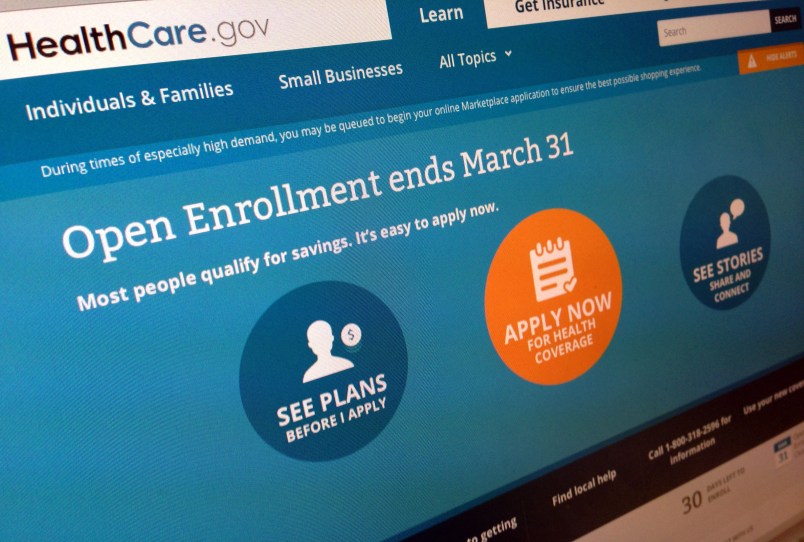With the departure of Aetna and other major insurers from a significant swath of Obamacare exchanges, health care industry analysts anticipate a dramatic increase in regions where competition in the Affordable Care Act marketplaces is low come the 2017 plan year. According to a report released Friday by the health care consulting firm Avalere, consumers in seven states are currently expected to have only one carrier option in their ACA marketplaces.
The report additionally compared the level of marketplace competition by geographical regions within each state.
“Avalere experts predict that one-third of the country will have no exchange plan competition in 2017, leaving consumers with few options for coverage,” a press release unveiling the report said.
Avalere’s predictions are based on insurers’ public announcements so far about their intentions for 2017. Those plans could still shift ahead of the Nov. 1 open enrollment period.
The Avalare report breaks down expected insurer competition level by exchange market rating regions, the geographic areas used to set insurance premiums. Thirty-six percent of exchange market rating regions may have only one or no carriers in 2017. Another 19 percent of market rating regions are currently expected to have two insurers, meaning less than half the market rating regions — 45 percent — will offer insurers three or more plans. That number could grow, however, if insurers announce plans to expand.
Comparatively, the plans announced in 2015 for the 2016 coverage year offered consumers in 67 percent of market rating regions three or more plans, while 29 percent of market rating regions had the participation of two carriers. Only four percent of market rating regions had one or no plans.

(Credit: Avalere)
Avalere explored how the expected decline in insurer marketplace competition would affect individual states. Alaska, Alabama, Kansas, North Carolina, Oklahoma, South Carolina and Wyoming were particularly hard hit. No exchanges in those states offer more than one carrier. Connecticut, Washington D.C., Delaware, Hawaii, Mississippi, Missouri Rhode Island, South Dakota, Vermont and West Virginia are all states where exchange consumers will have no more than two insurer options, according to current predictions.
“Depending on where consumers live, their choice of insurance plans may decrease for 2017,” Elizabeth Carpenter, senior vice president at Avalere, said in the press release. “Some exchange enrollees may need to choose another insurance plan in order to maintain coverage.”
The report went on to offer proposals Avalere experts said could address the issue of decreasing marketplace competition. It said enhancements to risk mitigation programs — such as changes to the risk adjustment transfer formula or the institution of a permanent reinsurance program — could help stabilize the exchanges. It urged tougher enrollment rules, such as limiting the use of special enrollment periods or locking out for a period customers who delay enrollment, that would mitigate adverse selection toward sicker insureds. The report also encouraged the creation of incentives for consumers to stay continuously on plans. Additionally, it called for proposals that would boost enrollment numbers, such as expanding subsidies or increasing individual mandate penalties.
Finally it suggested more flexibility in plan regulations that would allow insurers to offer products more attractive to younger and healthier consumers.
The U.S. Department of Health and Human Services responded to the report in a statement sent to TPM by HHS press secretary Marjorie Connolly.
“This report is premature and incomplete. A number of steps remain before the full picture of Marketplace competition and prices are known,” she said. “Regardless, we remain confident that the majority of Marketplace consumers will have multiple choices and will be able to select a plan for less than $75 per month when Open Enrollment begins November 1st.”
Update: This story has been updated to include a response to the report from the Department of Human Heath and Human Services.







It’s time to play hardball with these
crooksinsurance companies that make bank daily through Medicare.It would appear we are moving towards a national single payer, Medicare-type healthcare system far faster than conservatives ever thought possible.
It’s obvious that’s what consumers prefer because it’s easy to use and affordable. And private insurers like it, too, as they would rather administer a government approved plan than be constantly having to stand on their heads coming up with alternatives that don’t work as well and cost more than Medicare.
If the middle class and working poor get there faster than age 65, so much the better for all of us who aren’t filthy rich and stupid like the John Birchers, TeaBaggers and the Top 1%. They can pay their premiums and then pay again if they want. But they will pay their premium along with the rest of us… right out of their tax returns if necessary.
Or they can go to Russia with Trump to roll the dice with a far more risky kind of healthcare…and everything else.